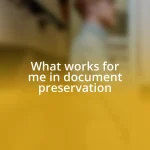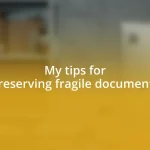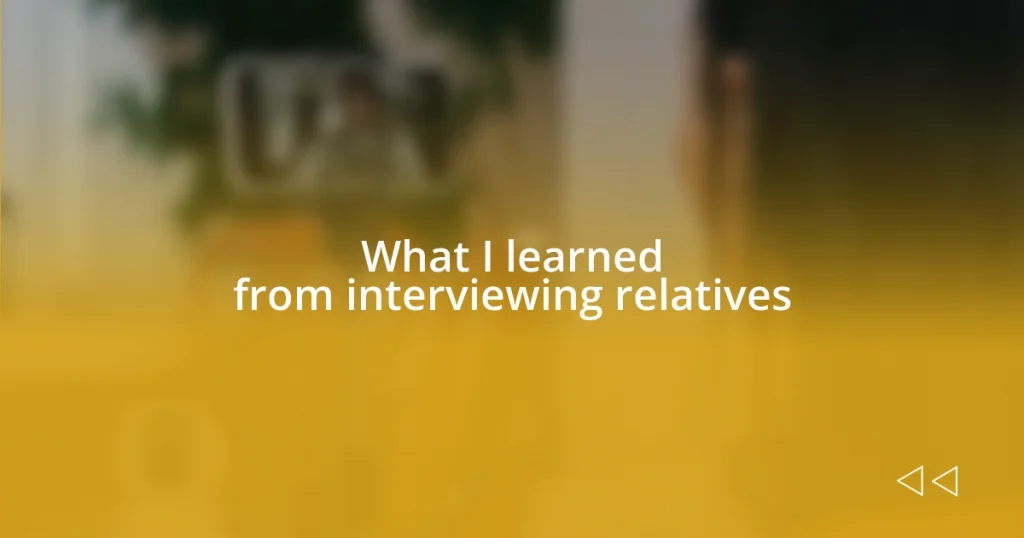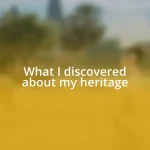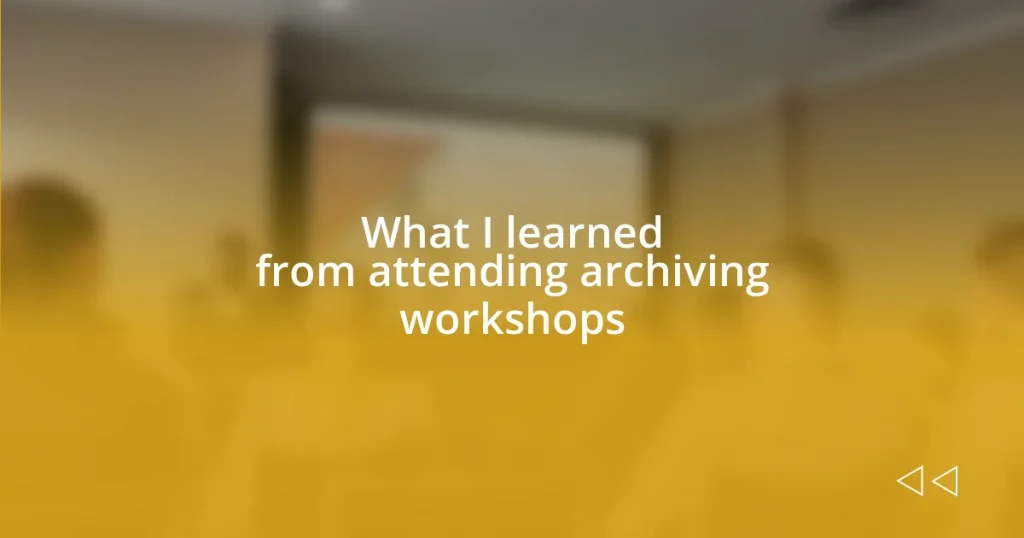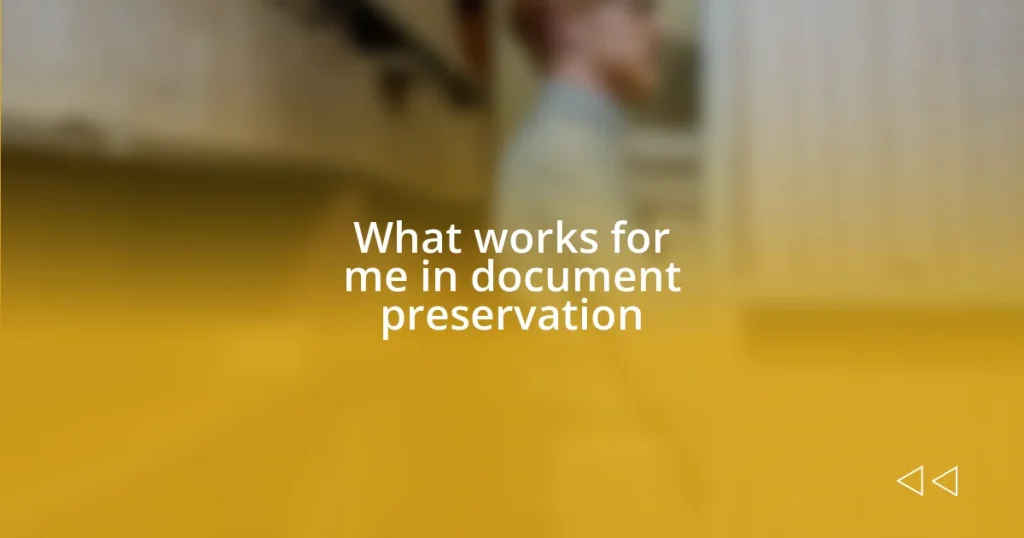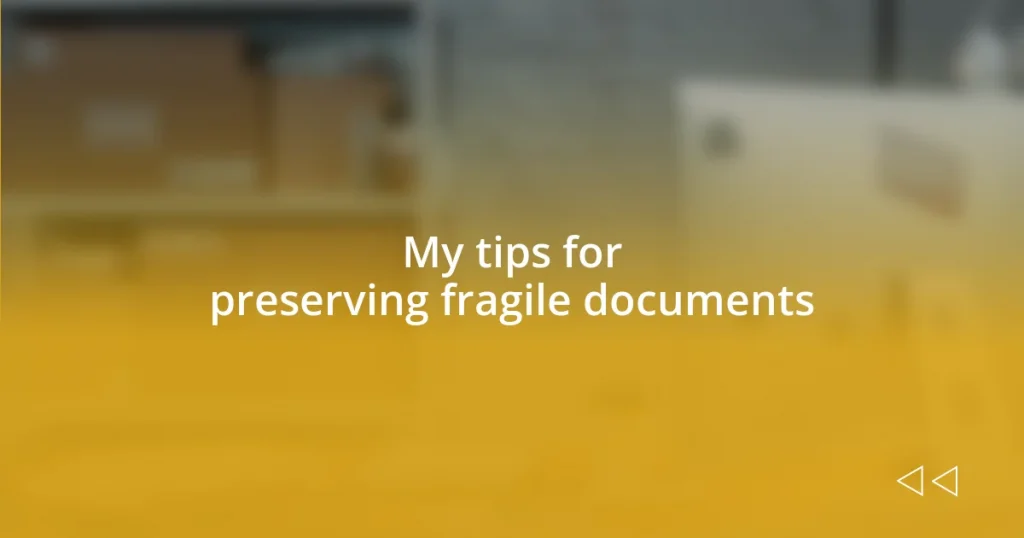Key takeaways:
- Family interviewing fosters deeper connections and understanding across generations, revealing hidden stories and emotions that shape family identity.
- Documenting and analyzing findings from interviews helps preserve family narratives, allowing for reflection on shared experiences and legacies.
- Engaging in discussions about family history and values can enhance appreciation for sacrifices and lessons learned, enriching the family’s legacy for future generations.

What is family interviewing
Family interviewing is essentially a conversation designed to gather insights, memories, and stories from relatives. When I first sat down with my grandmother, I didn’t realize how profound these discussions could be. Who knew that a simple question about her childhood could unfold stories of resilience and joy that shaped our family history?
At its core, family interviewing strengthens the bonds between generations. I remember asking my uncle about the family business he started. Listening to him recount those early struggles and triumphs made me feel a deep connection to my roots, almost as if I could feel the sweat and determination through his words. Have you ever felt that rush of pride when learning about your family’s legacy?
These interviews often reveal surprising details that spark curiosity and deeper appreciation. When I interviewed my cousin, I was stunned to learn about an old family rivalry that had been long forgotten. It made me wonder: how many stories are hidden within our families, waiting for the right questions to bring them to light?

Importance of family stories
Family stories are an essential thread that weaves together the fabric of our history and identity. During my interview with my aunt, I was captivated by her tales of our family’s immigration journey. I hadn’t realized until that moment how profoundly her experiences shaped my perspective on resilience. It’s incredible how stories passed down through generations can instill a sense of belonging and pride that transcends time and distance.
Here are a few reasons why family stories matter:
- Cultural preservation: They keep traditions and values alive.
- Identity formation: Stories help us understand who we are and where we come from.
- Emotional connection: Sharing experiences fosters empathy and strengthens familial bonds.
- Life lessons: They often contain invaluable wisdom that can guide us through our own challenges.
- Legacy building: These narratives contribute to the legacy we leave for future generations, connecting them to their roots.
Sharing these stories not only brings us closer but allows us to learn from the past, ensuring that the lessons and legacies of our families live on.

How to prepare for interviews
Preparing for an interview with relatives may seem straightforward, but I’ve learned that a few strategic steps can elevate your experience significantly. First, I suggest creating a list of open-ended questions. For example, instead of asking, “Did you like school?” try, “What was your favorite memory from school?” This slight shift not only encourages more engaging responses but also opens up avenues for deeper stories.
Another essential preparation tip is finding the right setting. I remember one interview where we sat in my grandmother’s cozy living room, surrounded by family photos. The ambiance brought forth nostalgia and comfort, prompting her to share stories she might have otherwise kept hidden. Choosing the right environment helps set the tone and encourages honesty and reflection during the interview.
Lastly, don’t forget to familiarize yourself with your relative’s life context prior to the interview. I recall my research on my father’s youth, which allowed me to ask tailored questions about the cultural influences of his generation. Knowing their background helps shape your conversation, making it more meaningful and connected to the family narrative.
| Preparation Step | Reason |
|---|---|
| Create Open-Ended Questions | Encourages deeper storytelling. |
| Choose the Right Setting | Creates a comfortable atmosphere for sharing. |
| Research Family Context | Leads to more personalized and engaging questions. |

Techniques for effective storytelling
I’ve discovered that the best storytelling often hinges on creating vivid imagery. When I shared my grandfather’s tales of sailing across stormy seas, the way I described the crashing waves and the salty air transformed the narrative. I found that painting a picture with words not only captivates the listener but also makes the story feel alive, inviting them to experience the emotions tied to those moments.
Using personal anecdotes is another technique that helps to connect deeply with the audience. For example, while recounting my mother’s struggles during her youth, I shared how her perseverance taught me the value of resilience firsthand. This not only breathes life into the narrative but also allows listeners to reflect on their own experiences, fostering a sense of shared understanding. Have you ever thought about how personal stories impact your perception of wisdom?
Moreover, varying your storytelling pace adds a dynamic flair that can captivate your audience. I once shared a family memory that flowed rapidly, filled with excitement, and contrasted it with a slower recounting of a more profound moment, allowing listeners to truly absorb the weight of that experience. This ebb and flow keep the audience engaged and can heighten emotional resonance, leaving them eager to hear what happens next.

Questions to ask relatives
When preparing to interview relatives, I’ve found that asking about family traditions sparks some of the richest conversations. I remember sitting down with my uncle, and when I asked, “What traditions have meant the most to you?” he launched into a heartfelt story about our family’s holiday gatherings, filled with laughter and a bit of mischief. It made me appreciate how deeply interconnected our experiences can be.
Another effective question is to inquire about life lessons they wish they had known earlier. I once posed this query to my aunt, and her answer about the importance of pursuing passions rather than conforming to expectations truly resonated with me. It got me thinking: What lessons do we often overlook or take for granted in our own lives?
Exploring dreams and aspirations is equally revealing. During a chat with my grandfather, I asked, “What was a dream you had as a young man?” He shared his desire to travel the world, and it opened the door to an intriguing discussion about the dreams he sacrificed for family. It made me wonder—what dreams have we set aside in our own journeys?

Analyzing and documenting findings
Documenting findings from interviews is a powerful way to preserve the rich stories and insights shared by relatives. I remember after interviewing my grandmother about her childhood, I meticulously organized my notes, highlighting key moments that stood out. It felt rewarding to see her journey crystallized on paper, allowing me to reflect on her experiences and their significance in shaping our family narrative.
As I analyzed my notes, I began to notice patterns and themes that emerged across different interviews. For instance, several relatives spoke about the sacrifices they made for the family, which sparked a deeper curiosity in me about the concept of legacy. This realization led me to ask more probing questions in subsequent interviews, such as, “What do you hope to pass down to future generations?” I found that these conversations opened up new dimensions of understanding and connection within my family.
In documenting these stories, I often added my own interpretations and emotional responses. I found that incorporating my feelings helped to create a more vivid record, transforming basic facts into a tapestry of human experience. Looking back on this process, I ask myself, how do we ensure that our family stories continue to resonate and inspire, even as generations pass? The act of documenting isn’t just about preserving the past; it’s about breathing life into it for the future.

Sharing insights with family
Sharing insights with family can lead to some of the most enlightening conversations one can have. I recall a time when my cousin and I sifted through old family photos together. As we flipped through the albums, each picture sparked not just memories but shared interpretations that revealed how different experiences shaped our views on family, love, and resilience. It was fascinating to see how perspectives could vary, yet still bring us closer together.
There’s something profoundly intimate about discussing our family’s history and lessons learned. I remember when my sister and I reminisced about our grandparents, and I shared my realization of their silent sacrifices. It made me wonder how often we really acknowledge the struggles that paved the way for our opportunities. Those moments of recognition deepened our understanding and appreciation of where we come from.
Engaging in these conversations often leads me to ask thought-provoking questions, like, “What do you value most about our family’s journey?” When I posed this to my father last holiday season, he shared his insights about loyalty and support that have always defined our lineage. Those reflections lingered in my mind long after, highlighting how insights shared today can influence our future decisions. How often do we pause to truly reflect on these shared values? Sharing insights isn’t just a way to connect; it’s an investment in our family’s legacy.

